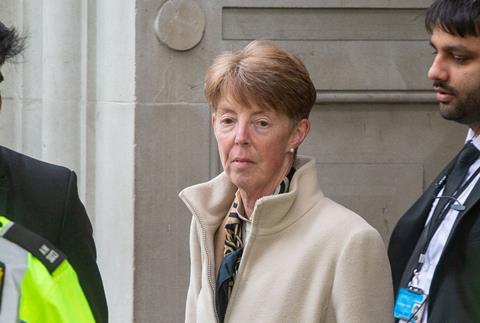Witnesses to the Post Office Inquiry have shown a tendency to be circumspect when it comes to blame. Pressed to name those responsible for failing in their duties, they will often struggle to recall or decline to identify individuals.
That was no such issue for Paula Vennells, the former chief executive. She stated from the outset of her evidence that her greatest failure was to be too trusting of people who hid the whole truth from her.
Invited to ‘give us the names’ about who was to blame, Vennells obliged: ‘I trusted the people who gave me the information, so on the IT side, Lesley Sewell and Mike Young… and, on the legal side, the general counsels, Susan Crichton and Chris Aujard and, later, Jane MacLeod, and those people I had worked with on numbers of other, very seriously important projects.’
Vennells might have hoped her appearance could counter or at least neutralise the narrative that she was the person responsible for the cover-up of this most egregious of miscarriage of justice scandals. Judging by the public response to her appearance, such hope is misplaced.
But if we take her evidence at face value, Vennells has opened a whole new level of culpability on the part of lawyers advising the Post Office after the prosecutions of sub-postmasters had largely stopped.
According to her evidence, it was the lawyers who failed to flag up or share advice that the Horizon IT system and its related convictions were flawed. It was lawyers who counselled against opening the floodgates by reviewing old cases, and lawyers who warned that even contacting one victim would be a ‘red rag to a bull’. Vennells said at one point she was reassured that ‘lawyers were doing what they needed to do’ in terms of disclosure. It was lawyers who led the civil litigation strategy to keep defending cases until the claimants ran out of money.

Indeed, it was Vennells pushing back against this culture of fighting claimants: ‘It wasn’t a policy that I put in place, and the questions I asked of [general counsel] Jane [MacLeod] on two occasions were, “This feels completely wrong to me, what can we do? We should not be in the process where we are fighting in court with subpostmasters”.’ Despite such misgivings, the litigation proceeded to a catastrophic outcome at trial.
Of course, one way Vennells could have overcome this problem of Chinese walls between her and the Post Office lawyers would have been to listen to them.
The inquiry heard excruciating details of the now infamous board meeting of July 2013 where Susan Crichton was due to update members about the progress of the forensic accountant report into Horizon. Crichton was left sitting outside the room (counsel Jason Beer KC described her as being like a ‘naughty schoolgirl’) and Vennells presented the paper instead.
Given Vennells’ complaints that she was excluded from key legal advice, perhaps it might have been wise to listen to some when it was offered. As was so often the case, however, this was not Vennells’ fault: instead chair Alice Perkins had excluded Crichton from the meeting without any input from the chief executive. Crichton was sacked three months later – not necessarily a sign of a chief executive who, as Vennells repeatedly claimed, had placed too much trust in her.
Even if we take her evidence at face value and absolve her of knowingly covering up the scandal, it was staggering incompetence for her not to be banging down the doors of those who were.
What Vennells' evidence has certainly done is focus even more attention on what the lawyers were doing during this period. Vennells was willing, with a little prompting, to point the finger - and regulators will certainly have been taking notes.



































